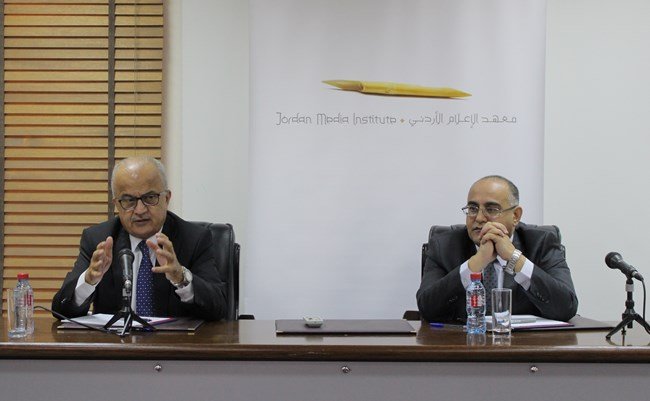Image:

27 Nov 2017
28 Nov. 2017 <br />
<br />
Amman- Former Foreign Minister Abdul-Ilah Al-Khatib said that the Jordanian state needs to renew its political elites because in Third World nations, political elites confuse personal interests with political interests. The elites must separate their own interests from national interests. This separation is clearly stipulated in the Jordanian Constitution.<br />
<br />
In a lecture he delivered at the Jordan Media Institute (JMI) under the title "Jordan and the Region," Al-Khatib said that "Jordan is not looking for a regional role, but sometimes this role for Jordan appears to be an inevitable necessity to protect national interests. Nations do not look for roles, but for interests."<br />
<br />
Al-Khatib added that Jordan must preserve its national interests and safeguard its security and stability. The Jordanian state has been one of few exceptions that have miraculously managed to positively cope with what is happening in the region. "Thanks to the state of institutions, Jordan has been able to maintain its security and stability despite some shortcomings in a small number of institutions," he said.<br />
<br />
On political reform in the Kingdom, Al-Khatib cited the experience of the Independent Election Commission (IEC) as he was the first person to chair it. He indicated that "the IEC managed to conduct fair elections to a large degree. The irregularities that occurred were not caused by state institutions, but by some citizens."<br />
<br />
The former chairman of the IEC Board of Commissioners added that "we still have a long way to go to have real participation in political life. Political parties have to be developed. This reform must go hand in hand with economic reform."<br />
<br />
On the economic front, Al-Khatib noted that Jordan's GDP exceeds $30 billion, while foreign aid is around $2 billion. Jordan can depend on its own huge human resources. He cited the example of <span style="background-color:rgb(242, 242, 242); color:rgb(0, 0, 0); font-family:tahoma; font-size:14px">Luxembourg</span> and Singapore, which managed to achieve economic progress despite their scarce resources. "We have to enhance the values of work for production and build a productive civil society," he said.<br />
<br />
On regional conditions, Al-Khatib said that "the national state is a modern state in the region with the exception of Morocco and Egypt. We cannot say that the Arab state failed because it is diverse. There are countries that are more diverse than the Arab states, but they have managed to build a national state based on the law and on integration of all shades of the population. This has not been the case in the Arab states."<br />
<br />
Al-Khatib pointed out that "the Arab states have been unable to build a safety net for the national state. This can only happen through self-confidence first and confidence in surrounding countries. The Arab states have not been successful in doing this. Nor have they been able to prevent interference in their domestic affairs." He added that "the weakness of the national states and of the regional order has precluded collective cooperation vis-à-vis all the important issues in the region, such as Palestine, Iraq, Syria, or even Iran."<br />
<br />
Al-Khatib cited as evidence of this weakness "the fact that the Arab states were not represented in the 'P5+1' group for negotiations with Iran over its nuclear program despite the fact that they are more concerned than others about relations with Iran and Iran's nuclear program." He further pointed out that "European states have managed to provide a safety net to East European nations and to take them from one system to another without descending into chaos."<br />
<br />
On the Arab-Israeli conflict, Al-Khatib said that Israel, represented by the ruling Likud Party, does not have the political will to withdraw from the occupied West Bank. There has been a clear policy in Israel toward this issue since 1996. The U.S. Administration, represented by President Trump, is incapable of forcing Israel to withdraw. Therefore, "we do not have all the necessary elements for concluding the ultimate deal during the term of the Trump Administration".<br />
<br />
Al-Khatib also referred to the Arab Spring, noting that "the collapse of the Arab order started when the Iraqi forces entered Kuwait in 1990. It was then aggravated with an unjustified war on Iraq in 2003. Besides, some Arab leaders were a main reason for the state of chaos that their countries have witnessed."<br />
<br />
Abdul-Ilah Al-Khatib served previously as foreign minister and was the first chairman of the IEC Board of Commissioners. He was also appointed by the United Nations Secretary-General as special envoy for Libya. He is currently the chairman of the board of directors of the Housing Bank for Trade & Finance.



